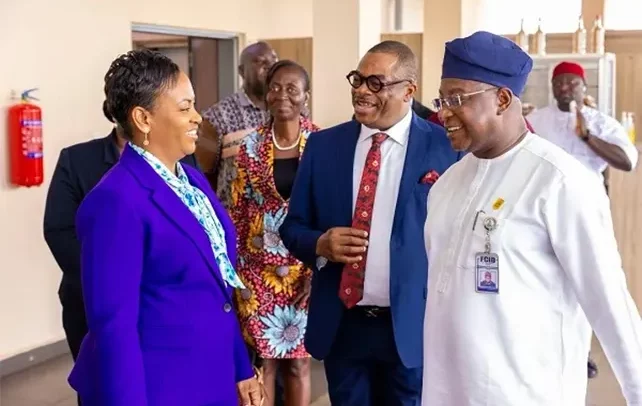COP Lydia Donkor in a hearty chat with the Nigeria DIG, Sadiq Abubakar as others look on
The Ghana Police Service and its Nigerian counterpart, the Nigeria Police Force, have agreed to establish a Joint Task Force (JTF) to tackle cross-border human trafficking, appoint focal officers for real-time information exchange, and develop standardized protocols for victim repatriation and referral.
They also resolved to launch joint awareness campaigns targeting youth and border communities, and to convene a high-level meeting of West African police chiefs to harmonise regional strategies against trafficking.
The agreements were reached during a high-level bilateral meeting in Abuja, Nigeria, last Friday, between a Ghana Police delegation led by the Director-General of the Criminal Investigation Department (CID), COP Lydia Yaako Donkor, and their Nigerian counterparts.
The two internal security agencies reaffirmed their commitment to intensifying joint efforts to combat human trafficking and related transnational crimes across West Africa.
The meeting was co-chaired by COP Donkor and the Deputy Inspector-General of the Nigeria Police Force, Sadiq I. Abubakar, and brought together senior officials from law enforcement, immigration, intelligence, and diplomatic institutions of both countries.
Discussions focused on emerging forms of human trafficking, their growing links with cybercrime, and the need for stronger regional cooperation to address the rising number of victims in the sub-region.
In his remarks, DIG Abubakar commended COP Donkor for her proactive initiative in proposing the meeting during the INTERPOL Africa Regional Conference in South Africa earlier this year.
COP Donkor, in turn, expressed appreciation to the Nigerian authorities for their collaboration and reaffirmed Ghana’s commitment to intensifying intelligence sharing and coordinated enforcement actions.
The meeting concluded with the signing of a communiqué to reaffirm the shared commitment of Ghana and Nigeria to dismantle human trafficking networks, protect victims, and sustain bilateral dialogue under the frameworks of ECOWAS and INTERPOL.


